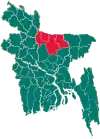Baksiganj Upazila
Bakshiganj (Bengali: বকশীগঞ্জ) is an upazila of Jamalpur District in the Division of Mymensingh, Bangladesh.[1]
Bakshiganj | |
|---|---|
.svg.png.webp) | |
| Coordinates: 25°13.5′N 89°52.5′E | |
| Country | |
| Division | Mymensingh Division |
| District | Jamalpur District |
| Area | |
| • Total | 238.39 km2 (92.04 sq mi) |
| Population (2011) | |
| • Total | 218,930 |
| • Density | 920/km2 (2,400/sq mi) |
| Time zone | UTC+6 (BST) |
| Postal code | 2140 |
| Website | bokshiganj |
Bakshigonj Thana was converted into an upazila in 1983.
The area of the Bakshigonj town is 238.39 km2. It has a population of 65,568; male 50.97%, female 49.03%; population density is 2820 per km2. Literacy rate among the town people is 39.9%.
History
Bakshiganj Thana was established in 1982 and was converted into an upazila in 1983.[1]
During the Bangladesh Liberation War, the Mukti Bahini attacked the Pakistan Army camp at Kamalpur several times.[1] Colonel Abu Taher lost his left leg on 14 November 1971, in one of those attacks.[2]
Geography
Bakshigonj is located at 25.2250°N 89.8750°E . It has 52,222 households and a total area of 238.39 km2. The upazila is bounded by Meghalaya state of India on the north, Islampur upazila on the south, Sherpur district on the east, and Dewanganj upazila on the west. The Garo Hills are on the north east part of the upazila.[1]
Demographics
| Year | Pop. (000) | ±% |
|---|---|---|
| 1981 | 437 | — |
| 1991 | 157 | −64.1% |
| 2001 | 178 | +13.4% |
| 2011 | 219 | +23.0% |
| Source: Bangladesh Bureau of Statistics[3] | ||
According to the 2011 Bangladesh census, Bakshiganj Upazila had 52,222 households and a population of 218,930. 60,495 (27.63%) were under 10 years of age. Bakshiganj has a literacy rate (age 7 and over) of 33.1%, compared to the national average of 51.8%, and a sex ratio of 1033 females per 1000 males. 28,890 (13.20%) lived in urban areas.[4][5]
According to the 2011 Bangladesh census, Baksiganj Upazila had 52,222 households and a population of 218,930, 13.2% of whom lived in urban areas. 12.7% of the population was under the age of 5. The literacy rate (age 7 and over) was 33.1%, compared to the national average of 51.8%, and the sex ratio was 1033 females per 1000 males.[4][6]
Administration
Baksiganj Upazila is divided into seven union parishads: Bagarchar, Bakshiganj, Battajore, Danua, Merurchar, Nilakhia, and Shadhurpara. The union parishads are subdivided into 25 mauzas and 199 villages.[3]
Economy
Economy of Bakshiganj Upazila is a major agricultural, but business and human resources are one of the key pillars of the economy of this area.
Newspapers
- Daily Urmi Bangla
- Daily Gonojoy
- Saptahik Bakshiganj
References
- Sayed Md Abdullah Al Mamun Chowdhury (2012), "Bakshiganj Upazila", in Sirajul Islam and Ahmed A. Jamal (ed.), Banglapedia: National Encyclopedia of Bangladesh (Second ed.), Asiatic Society of Bangladesh
- Hossain, Md Anwar (2012). "Taher, Colonel Abu". In Islam, Sirajul; Jamal, Ahmed A. (eds.). Banglapedia: National Encyclopedia of Bangladesh (Second ed.). Asiatic Society of Bangladesh.
- "District Statistics 2011: Jamalpur" (PDF). Bangladesh Bureau of Statistics. Archived from the original (PDF) on 13 November 2014. Retrieved 14 July 2014.
- "Community Report: Jamalpur. Population & Housing Census 2011" (PDF). Bangladesh Bureau of Statistics. November 2014. Retrieved 18 September 2023.
- "Bangladesh Population and Housing Census 2011 Zila Report – Jamalpur" (PDF). bbs.gov.bd. Bangladesh Bureau of Statistics.
- "Population and Housing Census 2011: Bangladesh at a Glance" (PDF). Bangladesh Bureau of Statistics. Archived from the original (PDF) on 28 July 2014. Retrieved 21 July 2014.
